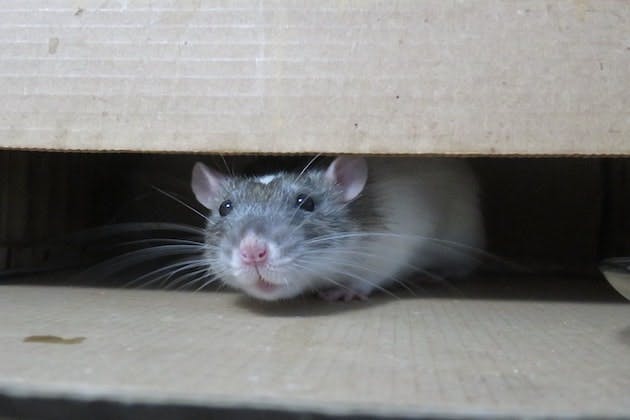When faced with a rat infestation in your home, there's a chance that panic will set in and you'll be scared to do anything about it but call in an expert pest control specialist. But in reality, they won't always be able to come to your home immediately.
This comprehensive guide will walk you through the process of safely and effectively removing rat nests while preventing future infestations.
How to Identify a Rat Nest
Rat nests are typically constructed from soft materials readily available in and around homes. These nests often resemble bird nests but are composed of shredded paper, cardboard, cloth, and insulation. You'll find them in secluded, dark areas that offer warmth and protection.
Common locations for rat nests include:
- Attics
- Crawl spaces
- Wall voids
- Behind appliances
- In dense vegetation near buildings
Look for clusters of shredded materials in corners or hidden spaces. Alongside the nest, you may notice droppings, gnaw marks, and greasy smears along walls or baseboards.

How To Get Rid Of A Rat Nest
Assessing the Situation
Before taking any action against a rat infestation, conducting a thorough assessment is crucial. Start by examining your property for common signs of rat activity. Fresh droppings, often dark and pellet-shaped, indicate recent rat presence. Look for gnaw marks on wooden structures, electrical wires, or food packaging. You might notice grease marks along walls where rats frequently travel, as their fur leaves dark, oily residues.
Rat nests are typically found in quiet, undisturbed locations. These rodents prefer dark, warm spaces and commonly construct their nests using whatever soft materials they can find. Search thoroughly in attics, examining insulation for signs of disturbance. Check wall voids, especially near food sources or water pipes. Inspect crawl spaces, focusing on corners and areas near structural supports. Listen for scratching sounds in walls, particularly at night when rats are most active.
Securing Food Sources
Rats are opportunistic feeders, and eliminating their food sources is fundamental to control. Begin in the kitchen by storing all dry goods in heavy-duty plastic or metal containers with tight-fitting lids. Rice, cereals, and pet food are particularly attractive to rats and should be secured immediately. Clean your kitchen thoroughly, paying special attention to areas under appliances where food particles might accumulate.
Move to your pantry and organize it methodically. Dispose of any damaged packages and transfer their contents to sealed containers. Install door sweeps to prevent rats from accessing food storage areas. Outside, ensure garbage bins have secure lids and are regularly emptied. Remove fallen fruit from trees and clean up any spilled birdseed. If you have pets, establish a feeding schedule where food is available for limited periods and cleaned up afterwards.
Sealing Entry Points
A comprehensive exclusion strategy is essential for long-term rat control. Begin your inspection at the foundation, looking for gaps where utility lines enter the building. Rats can squeeze through holes as small as a quarter, so even minor openings need attention. Use durable materials for sealing: copper mesh for small gaps, sheet metal for larger holes, and concrete for foundation repairs.
Examine your roof carefully, paying attention to joints, vents, and areas where different materials meet. Check all exterior doors for proper weatherstripping and ensure they close tightly. Install or repair screens on all vents, including those in the attic and crawl space. Remember to check for tree branches that might provide roof access and trim them back at least six feet from your house.
Using Traps
Effective trapping requires careful planning and consistent monitoring. Start with snap traps, placing them perpendicular to walls with the trigger end facing the wall. Bait traps with peanut butter, chocolate, or dried fruit – foods high in protein or sugar are most attractive to rats. Place traps in pairs about two to three feet apart along established rat runways.
For larger infestations, create multiple trapping stations throughout your property. Check traps daily, wearing protective gear when handling them. Replace bait every few days even if untouched, as stale bait loses its effectiveness. Keep detailed records of trap locations and success rates to identify patterns in rat movement and adjust your strategy accordingly.

Natural Predators
While cats and dogs can be effective deterrents, their success depends on various factors. Choose cat breeds known for their hunting abilities, such as Maine Coons or American Shorthairs. However, remember that not all cats are natural hunters, and even skilled mousers may ignore rats. If considering a dog, terrier breeds historically bred for ratting, like Jack Russells or Yorkshire Terriers, tend to be most effective.
When introducing natural predators, create an environment that supports their hunting success. Maintain clear sightlines in potential hunting areas and provide your pets access to spaces where rats are active. Consider installing pet doors to allow constant patrol of problem areas. Remember that while pets can help control rat populations, they should be part of a broader control strategy.
Using Repellents
Natural and chemical repellents can be valuable tools in your rat control arsenal. Peppermint oil, a natural deterrent, can be applied by soaking cotton balls and placing them strategically around your property. Refresh these every few days as the scent fades. Commercial repellents containing predator urine or bitter substances can be applied around entry points and along rat pathways.
Ultrasonic devices, while controversial, may provide additional deterrence when used as part of a comprehensive approach. Place them in enclosed spaces where rats are active, ensuring no furniture or walls block the sound waves. Electronic repellents should be moved periodically as rats may become accustomed to them in a fixed location.
Implementing Sanitation Measures
A clean environment is crucial for long-term rat control. Start by decluttering your space, and removing old newspapers, cardboard boxes, and other materials rats might use for nesting. Clean your kitchen daily, paying special attention to areas under appliances and in corners. Use sealed containers for compost and ensure outdoor compost bins are rat-proof.
Maintain your yard by regularly removing debris, keeping grass short, and cleaning up fallen fruit or nuts. Store firewood at least 18 inches off the ground and 12 feet from any structure. Clean gutters regularly to prevent water accumulation that might attract rats. Consider installing metal gutter guards to prevent rats from using gutters as highways to your roof.
Seeking Professional Help
When selecting a pest control service, look for companies with specific experience in rat control. Request detailed inspections and written treatment plans. Ask about their integrated pest management approach and ensure they offer follow-up services. Verify that they're licensed, and insured, and use environmentally responsible methods.
Professional services should include a thorough property inspection, identification of entry points, and a customized treatment plan. They should also provide documentation of their findings and recommendations for preventing future infestations. Consider signing up for regular monitoring services to catch any new problems early.
Implementing Preventive Measures
After eliminating the current infestation, establish a prevention routine. Conduct monthly inspections of your property, checking previously sealed entry points and looking for new ones. Create a cleaning schedule that includes regular checks of potential food sources and harborage areas. Install motion-sensor lights in dark areas where rats might try to establish new nests.
Maintain a prevention log documenting any signs of rat activity, successful deterrent methods, and areas requiring regular monitoring. Review and update your prevention strategy seasonally, as rat behaviour and pressure points may change throughout the year. Consider installing permanent monitoring stations around your property's perimeter for early detection of new activity.
Book a Pest Control in Portsmouth, Gosport, Fareham and Petersfield
Simply call us at 07501702101 and we will try to reach your property in Portsmouth, Fareham, Gosport or Hampshire as soon as we can.


